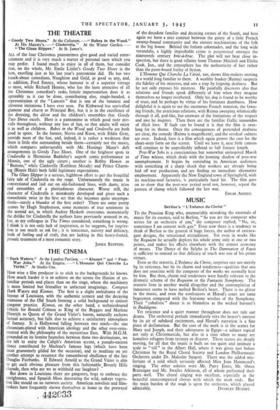MUSIC Berlioz's " L'Enfance du Christ "
To the Prussian King who, amateurishly mistaking the externals of music for its essence, said to Berlioz, "So you are the composer who writes for an orchestra of 500," the composer replied, " No, sir, sometimes I am content with 450." Even now there is a tendency to think of Berlioz as •the general of huge forces, the author of extrava- gant designs, the sensational attitudiniser. Yet even in works like the Requiem he actually deploys his whole army only at one or two points, and makes his effects elsewhere with the utmost economy of means. The Dance of the Sylphs in The Damnation of Faust is sufficient to remind us that delicacy of touch was one of his prime virtues.
Even so the oratorio, L'Enfance du Christ, surprises one not merely by its reticence, but by its charm and tenderness—qualities that one does not associate with the composer of the works we normally hear by him. But then, charm and tenderness were hardly relevant to the dramatic scheme of the Requiem or the Fantastic Symphony. The oratorio lives in another world altogether and the contemplation of innocence seems to have melted Berlioz's heart. There is no glitter in the music, and even the soothsayers at Herod's court are tame bogeymen compared with the fearsome witches of the Symphony. Their " cabalistic" dance is as blameless as the wicked baronet's in Ruddigore.
Yet reticence and a quiet manner throughout does not rule out drama. The orchestral prelude immediately stirs the hearer's interest by its air of subdued excitement, and Herod's narration is a fine piece of declamation. But the core of the work is in the scenes for Mary and Joseph, and their adventures in Egypt—a subject topical not only at Christmastide, but also in a time when so many are homeless refugees from tyranny or disaster. These scenes are deeply moving, for all that the music is built on too quiet and intimate a scale to " tell " in the Albert Hall, where it was given just before Christmas by the Royal Choral Society and London Philharmonic Orchestra under Dr. Malcolm Sargent. There was the added mis- fortune of a cold which seriously affected Miss Joan Hammond's singing. The other soloists were Mr. Parry Jones, Mr. Owen Brannigan and Mr. Swailes Atkinson, all of whom performed their parts -well. The choral singing was excellent, especially in the beautiful unaccompanied chorus with which the work ends. But the main burden of the work is upon the orchestra, which played


























 Previous page
Previous page